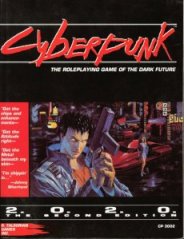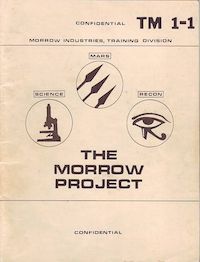Related Research Articles

A role-playing game is a game in which players assume the roles of characters in a fictional setting. Players take responsibility for acting out these roles within a narrative, either through literal acting or through a process of structured decision-making regarding character development. Actions taken within many games succeed or fail according to a formal system of rules and guidelines.

The Legend of Zelda is an action-adventure game franchise created by the Japanese game designers Shigeru Miyamoto and Takashi Tezuka. It is primarily developed and published by Nintendo, although some portable installments and re-releases have been outsourced to Flagship, Vanpool, and Grezzo. Its gameplay incorporates action-adventure and elements of action RPG games.

Cyberpunk is a tabletop role-playing game in the dystopian science fiction genre, written by Mike Pondsmith and first published by R. Talsorian Games in 1988. It is typically referred to by its second or fourth edition names, Cyberpunk 2020 and Cyberpunk Red, in order to distinguish it from the cyberpunk genre after which it is named.

Zelda II: The Adventure of Link is an action role-playing game developed and published by Nintendo. It is the second installment in the Legend of Zelda series and was released in Japan for the Famicom Disk System on January 14, 1987—less than one year after the Japanese release and seven months before the North American release of the original The Legend of Zelda. Zelda II was released in North America and the PAL region for the Nintendo Entertainment System in late 1988, almost two years after its initial release in Japan.

A role-playing video game, role-playing game (RPG) or computer role-playing game (CRPG) is a video game genre where the player controls the actions of a character immersed in some well-defined world, usually involving some form of character development by way of recording statistics. Many role-playing video games have origins in tabletop role-playing games and use much of the same terminology, settings, and game mechanics. Other major similarities with pen-and-paper games include developed story-telling and narrative elements, player character development, complexity, as well as replay value and immersion. The electronic medium removes the necessity for a gamemaster and increases combat resolution speed. RPGs have evolved from simple text-based console-window games into visually rich 3D experiences.

The Morrow Project is a science fiction role-playing game created by Kevin Dockery, Robert Sadler and Richard Tucholka and published by Timeline Ltd. It is set after a devastating nuclear war. It was first released in the 1980s, and As of 2003 it still has a loyal following. The fourth edition was released as of December 15, 2013 by Chris Morrell and Robert O'Connor.
Hack and slash, also known as hack and slay or slash 'em up, refers to a type of gameplay that emphasizes combat with melee-based weapons. They may also feature projectile-based weapons as well as secondary weapons. It is a sub-genre of beat 'em up games, which focuses on melee combat, usually with swords. Third-person hack and slash games are also sometimes known as character action games and spectacle fighters.
Tactical role-playing games, also known as strategy role-playing games and in Japan as simulation RPGs, are a video game genre that combines core elements of role-playing video games with those of tactical strategy video games. The formats of tactical RPGs are much like traditional tabletop role-playing games and strategy games in appearance, pacing, and rule structure. Likewise, early tabletop role-playing games are descended from skirmish wargames such as Chainmail, which were primarily concerned with combat.
1984 saw many sequels and prequels along with new titles such as 1942, Boulder Dash, Cobra Command, Jet Set Willy, Karate Champ, Kung-Fu Master, Yie Ar Kung-Fu and Punch-Out!! The year's highest-grossing arcade video games were Pole Position in the United States, for the second year in a row, and Track & Field in the United Kingdom. The year's best-selling home system was Nintendo's Family Computer (Famicom), which was only sold in Japan at the time.

A video game with nonlinear gameplay presents players with challenges that can be completed in a number of different sequences. Each player may take on only some of the challenges possible, and the same challenges may be played in a different order. Conversely, a video game with linear gameplay will confront a player with a fixed sequence of challenges: every player faces every challenge and has to overcome them in the same order.

A tabletop role-playing game, also known as a pen-and-paper role-playing game, is a classification for a role-playing game (RPG) in which the participants describe their characters' actions through speech, and sometimes movements. Participants determine the actions of their characters based on their characterization, and the actions succeed or fail according to a set formal system of rules and guidelines, usually containing Dice-Rolling. Within the rules, players have the freedom to improvise; their choices shape the direction and outcome of the game.

Timemaster is a role-playing game centered on traveling through time and alternate dimensions, published by Pacesetter Ltd in 1984. Players take on the role of Time Corps agents who fix deviations in the timeline of the game. The primary antagonists are the Demoreans, a fictional race of shape-shifting aliens from another dimension who are determined to mold time to suit their needs.
Time & Time Again is a role-playing game published by Timeline Ltd. in 1984.

Star Trek Timelines is a strategy role playing video game developed by Disruptor Beam for iOS and Android devices, Facebook, Facebook Gameroom, the Amazon Store, and Steam. On March 4, 2020 Tilting Point acquired the game from Disruptor Beam and created a new studio Wicked Realm Games to support the title. The player is the captain of a ship and can form their ship's crew from characters from any era of Star Trek, while steering the fate of the galaxy through diplomacy, science and force of arms.

Timeline is a 2000 adventure/puzzle video game published by Eidos Interactive for the Microsoft Windows. The game was developed by author Michael Crichton's Timeline Computer Entertainment, and is based on Crichton's 1999 novel of the same name. Crichton was directly involved in the game's creation.
The Morrow Project Gamemaster's Shield and Reference Tables is a 1981 role-playing game supplement published for The Morrow Project by Timeline.

Clash of Kings, subtitled "A Tale of Arthur and Merlin", is an adventure published by Pacesetter Ltd in 1984 for their time-travelling role-playing game Timemaster

Crossed Swords is an adventure published by Pacesetter Ltd in 1984 for the fantasy time-travel role-playing game Timemaster.
References
- ↑ Schick, Lawrence (1991). Heroic Worlds: A History and Guide to Role-Playing Games. Prometheus Books. p. 349-350. ISBN 0-87975-653-5.